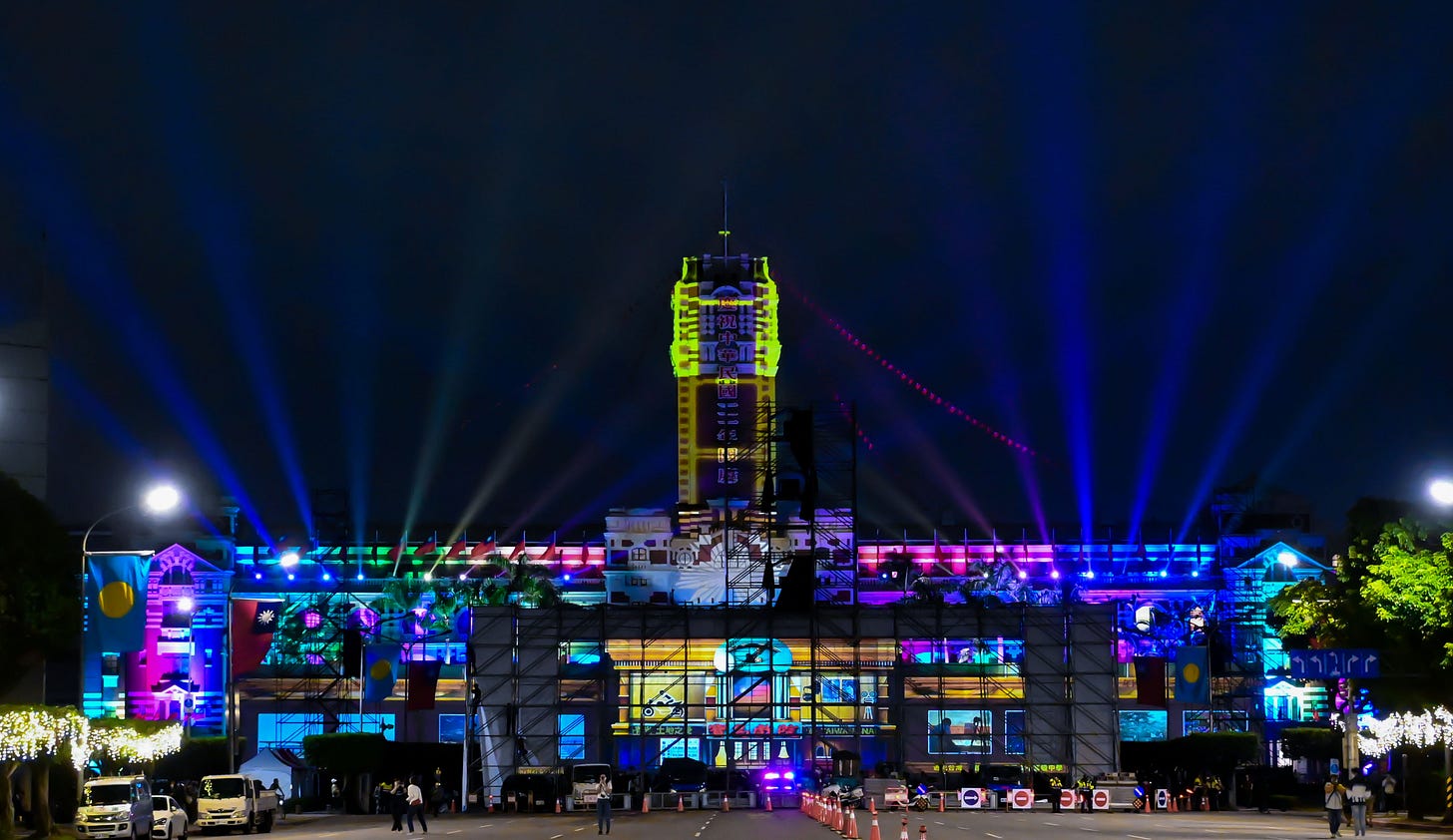Monday of last week was national day in Taiwan. I research nationalism. I am in Taiwan.
[Extended fangirling break]
For those who don’t know, Taiwan’s national day is on October 10th—hence its nickname, “Double-Ten Festival” 雙十節. The date commemorates the 1911 protests in Wuhan that kicked off the Xinhai Revolution, which led to the fall of the Qing Dynasty. (It’s also not to be confused with China’s national day, celebrated on October 1st to commemorate the day in 1949 on which the People’s Republic was officially established.)
Taking part in this year’s Taiwan’s national day celebrations, I was able to get a taste of a bit of everything: arts, culture, tech, soul-crushing bureaucracy, this festival had it all! It was also one of those rare moments as a researcher where I felt like the universe (or in this case, the laser lights show) was quietly telling me that I’m heading in the right direction.
Greatest Hits, Revisited: Bureaucracy’s Back, Baby!
Last week I reported back on my first trip to Taoyuan and the joys of going to a specially designed refuge for bronze-colored white elephants in search of blue nostalgia.
But that same long weekend also gave me the opportunity to relive some of my greatest bureaucratic hits of the past here in Taiwan. This started bright and early, when I woke up to arrive for the national day celebrations at the Presidential Office Building, starting at 8:30am. Emerging from the subway station, I wandered for a while looking for the entrance to the event. Finally, I asked one of the dozens of highly visible police officers how to get to the event. He replied, “It’s here. But did you apply?”
Quoi?
It had never occurred to me to apply to attend a national day celebration. Indeed, an application process sort of implies that this isn’t really national so much as a select few hand-picked individuals that can be representative of the national on camera. So I asked, “Apply?”
“Yes. On the website.”
Ah, of course. The website.
Now, I spent a fair amount of time looking up information about this event in advance (including enlisting the help of my unendingly patient, generous, and supportive Taiwanese friends). In none of the information I came across was an application mentioned. Upon pointing this out to the very stoic guard, he repeated, “It’s on the website.”
There is, apparently, only one website.
This was obviously a major disappointment to a researcher who studies nationalism. But it was also a strangely appropriate way to start this day of national celebration. After all, I spent the better part of two years trying to get across the border into Taiwan, during which time grants from private foundations, the US federal government, and Taiwan’s federal government all failed to persuade the Ministry of Foreign Affairs to let me across the border. Meanwhile, repeated inquiries as to how I might apply for an exemption, or simply find someone to whom I might appeal for mercy were all met with the reply, “Yes, if you receive a letter of exemption, you will be allowed to travel to Taiwan.”
Again, do you have a recommendation of whom I might contact for such an exemption?
“Yes, if you receive a letter of exemption, you will be allowed to travel to Taiwan.”
Perhaps if I had checked the website …
Ending on the Bright Side
Luckily, my Double-Ten Festival was rescued by a friend who coaxed me to go with him to the nighttime lights show at the Presidential Office Building (truly a friend who understands how to cheer up a researcher). This, he assured me, required no application, as he had personally attended the event in the past, sans application.1
When I heard there was a lights show at the Presidential Office Building, I don’t know what I was expecting. Maybe something along the lines of the Zentipede laser lights show in Bob’s Burgers?
What I definitely did not expect was that the Taiwanese government had graciously gifted me an entire dissertation chapter. (Well, a good chunk of one, at least.)
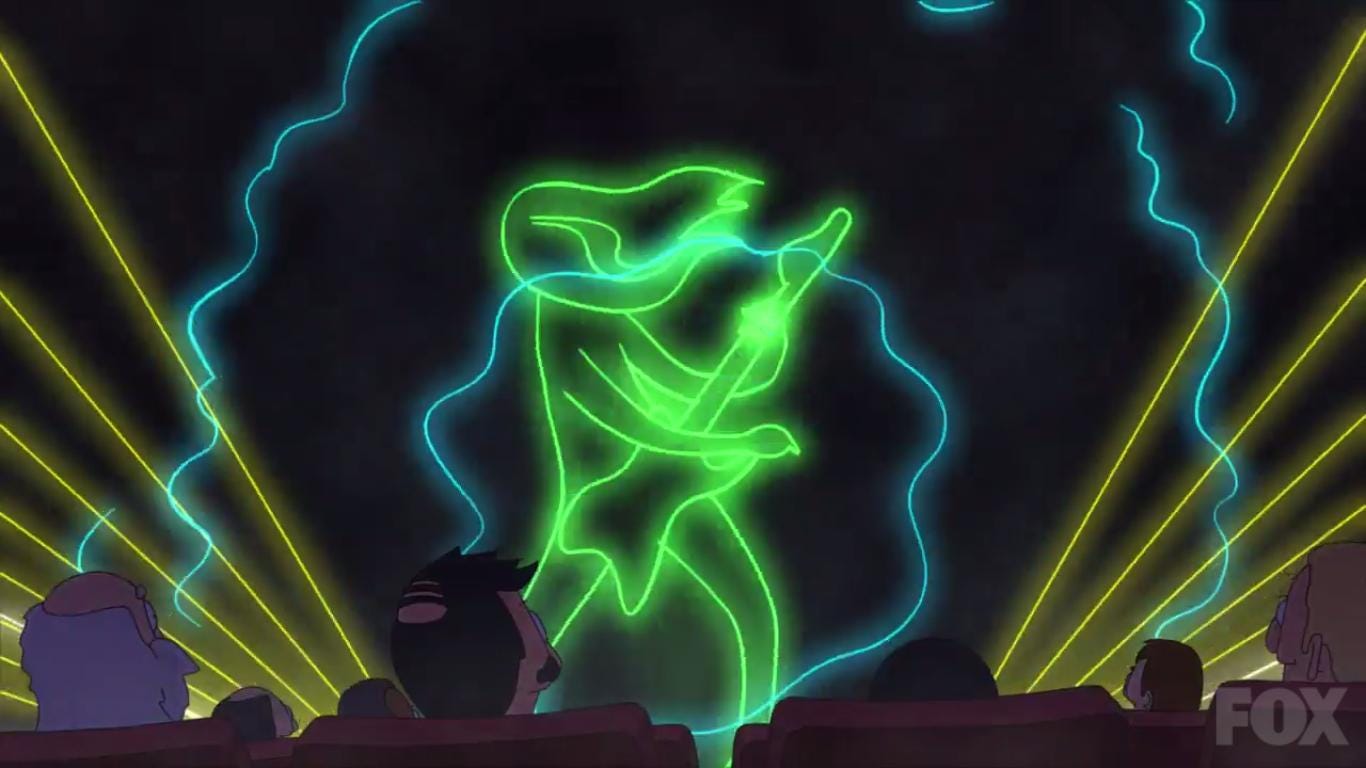
The lights show ran for several nights in the square in front of the Presidential Office Building. Although the late showings I attended were predominantly populated by young people, there were also many families in evidence (including, as we passed through the main entrance to the square, one young child who demanded impatiently of his father, “Where’s [President] Tsai Ing-Wen?”)
More importantly from my perspective, this was a government-sponsored event that explicitly describes the entanglements between Taiwanese nationalism and the arts. It then proceeds to engage those very entanglements in order to manage, mobilize, and manipulate audiences’ emotional responses in an attempt to bind viewers emotionally to the nation.
What do I mean by emotional manipulation, or by the idea of binding viewers emotionally to the nation? To answer that, we can start, as did Julie Andrews, at the very beginning.
Film, Family, Nation
The opening two-plus minutes of the show comes out swinging, albeit with a fist full of tissues. In just over 150 seconds, this nakedly sentimental short film goes from the narrator’s birth in his family home, through to him raising his own family and his children leaving home.
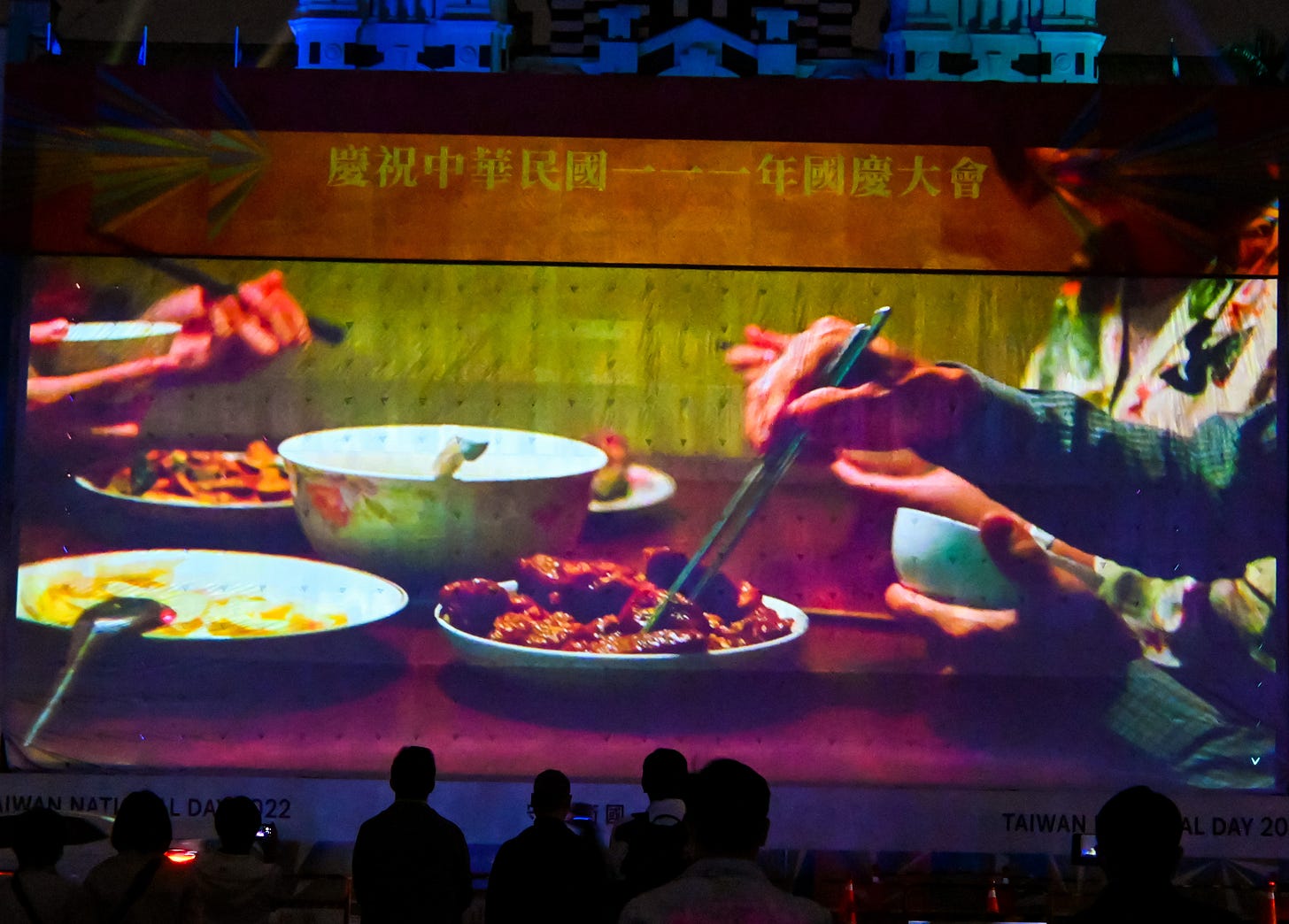
Visually, the film focuses on small, everyday acts of familial love: learning how to cook from grandma; offering up a choice piece of food at dinner; a rice cooker bubbling on a countertop; a tray of food for a child studying for exams; care packages sent to adult children; covering a dozing parent with a blanket. If this list just so happens to read like a catalog of tropes from family dramas on Taiwanese TV, all the better, as it means audiences are already primed to understand the emotional content.
Textually, the film hammers at the word jia 家 (“home”). It opens with the statement, “This is my home.” It goes on to define home in a variety of ways (which I have also added as quick and dirty subtitles to the video below):
This is where I was born. This is where I learned the flavors of home … Home is the basic necessities. Home is the future we build together. Home isn’t just a place to live … Home is identity. Home is mutual support, no matter the cost. We will defend home, just as it is always defending us, because at all times, home is always there for you. This is my home. My homeland.
This last statement is huge, particularly in the current state of heightened tensions over Taiwan. You see, I finessed the final word of film as “homeland” in order to emphasize the ongoing link to the word “home.” But in Chinese, jia can also mean “family.” Furthermore, the final word of the narration is guojia 國家, a compound word that combines the characters for “country” and “home” to create the concept of “nation.” Thus, this film cleverly uses a semantic overlap to create an emotional link between the intimacies of home, family, and nation. It also unequivocally states Taiwan’s self-identification as a guojia.
Musically, all of this unfolds over the accompaniment of Liebestraum no. 3—Liszt at his most sentimental. With the same, unchanging soundtrack throughout, it doesn’t really matter if we’re looking at an image of a son leaving home for military service, a grandmother and her grandson in the kitchen, or a young married couple squabbling. It doesn’t really matter if we’re listening to a statement about the flavors of home, the definition of home, or what we’re willing to do on behalf of home. They’re all subsumed into the same bittersweet sentiment generated by the Liebestraum. This is not a national day production that demands pride in the bombast of the nation’s glories; rather, it forges emotional associations between audience and island, one heartstring, one tear at a time.
From here, the production moves onto a short introduction, with a cheery-voiced narrator saying,
We collectively are energized by the coalescence of democracy and freedom … Love embraces Taiwan, the Island of Light … [This show] embarks from our everyday life, using Taiwanese classics from the last century to explore the connection, passion, and expectations for this island, for this life. The force of creativity, deep-rooted in the island of Taiwan, is the source enriching our lives and culture. Surviving the trials of time, it continues to shine onto our future. Together, we pass on this love embracing Taiwan. Together, we become that island of light, for you and me.
Finally, the lights show launches into a fabulously sleek 3D montage highlighting the greatest hits from the last century of Taiwan’s visual, cinematic, and musical arts.
[Further extended fangirling]
Culture and History in/as Nation
People, this is literally my research (although the final product of my work will be disappointingly 2D)! Could organizers have used this display of technological virtuosity to heap praises on Taiwan’s military? Yes. Could the same 3D video technology have been used to create a sleek montage of Taiwan’s achievements in tech, medicine, sports, or tourism? Yes, yes, yes, and yes.
But they didn’t. For this eight-minute multimedia ode to a Taiwanese homeland, the producers in Taiwan’s Ministry of Culture chose, well, culture. They pulled on music, film, and art featuring Mandarin, Hokkien, Hakka, and aboriginal images, languages, and timbres. They ultimately created a technically dazzling multimedia spectacle that is global in scope, drawing on artworks that bear undeniable traces of French Impressionism and Japanese modernism, musical performances that range from Mandopop to klezmer, and films stretching from Chaplin-esque slapstick to Taiwan New Cinema. At the same time, the combination of language, culture, and style represented in these media artefacts is a profoundly local amalgamation of Taiwan’s unique historical circumstances and experiences.
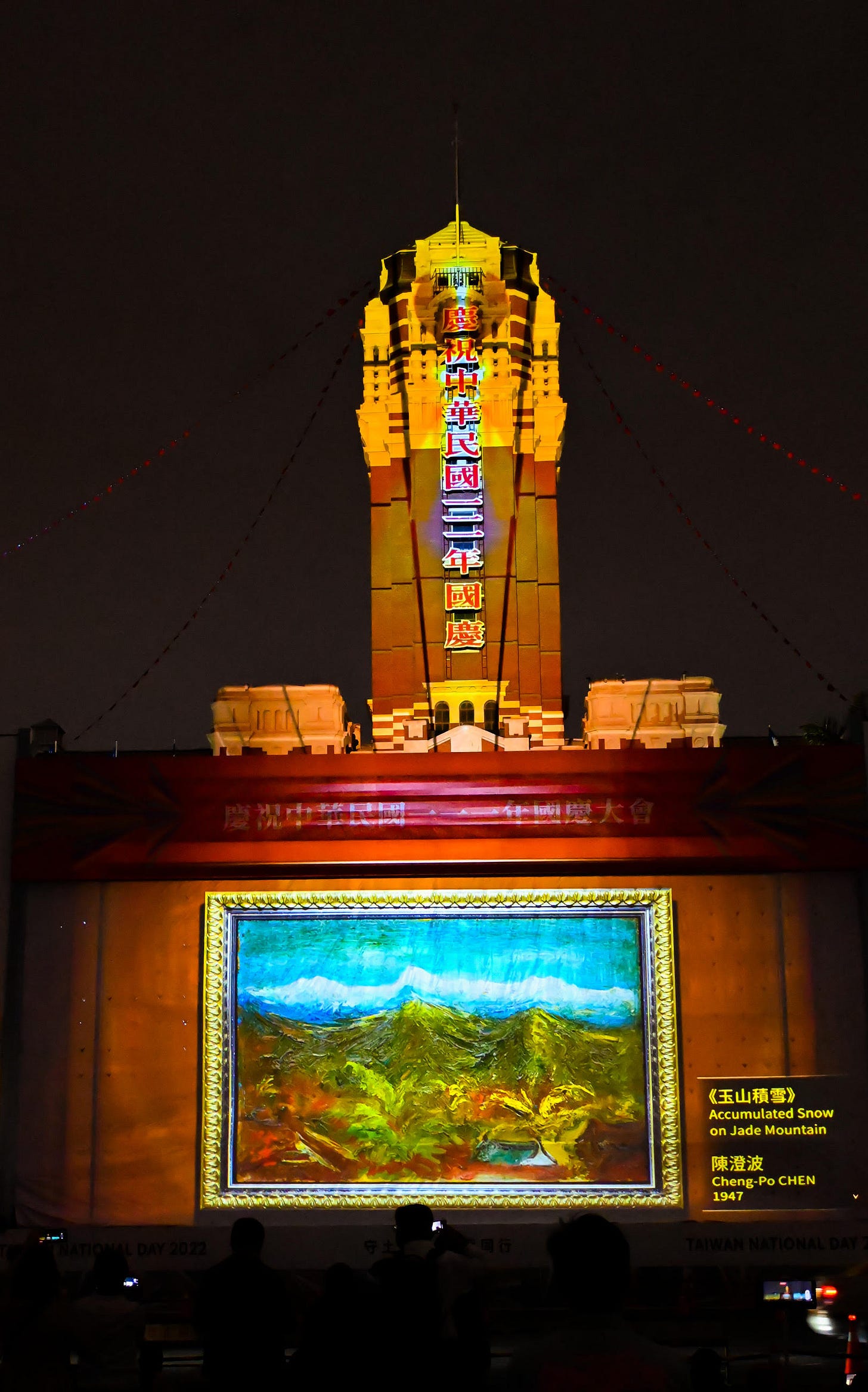
Spirit Fingers and Sovereignty
An earlier presentation (not open to mere mortals such as myself—not even by application!—but graciously shared via YouTube) featured a Broadway-style song-and-dance number titled “Taiwan Has a Hollywood” 台灣有個好萊塢. Surprising though this performance might seem at first glance, it actually helps frame the main public video presentation.
First of all, these performers understand one of the fundamental laws of Broadway: if you’re going to use jazz hands, you go all in. Second, it suggests why this national day celebration might focus on arts and culture.
Sure, the main lights show establishes a long historical lineage of cultural and artistic productions that are unique to Taiwan, setting up a cultural genealogy unique to the island. But by going on an extended song-and-dance break to make an argument for a “Hollywood in Taiwan,” this framing event goes further. It suggests that Taiwanese arts and cinema don’t just establish a historical genealogy for the island, and they don’t just deserve local acclaim. Rather, it intimates that Taiwan is a global cultural power, and that local cultural products can become just as iconic of Taiwan as Hollywood is of the United States. By drawing a direct link between Taiwan and Hollywood, it suggests that these are prestige products that deserve recognition not only as cultural objects, but as Taiwanese cultural objects.
I could go on at even greater length about this event—the song choices, the kinds of film clips used, the LGBT representation on screen, the slow build to the show’s closing anthem, “Eternal Taiwan” 永遠存在的台灣 (in Taiwanese dialect, not Mandarin!) For now I’ll just say, if you’d like to see everything I have to say about music, nationalism, and Taiwan’s Double-Ten Festival, please feel free to consult the yet-to-be-written final chapter of my dissertation.
National Day in a Contested Nation
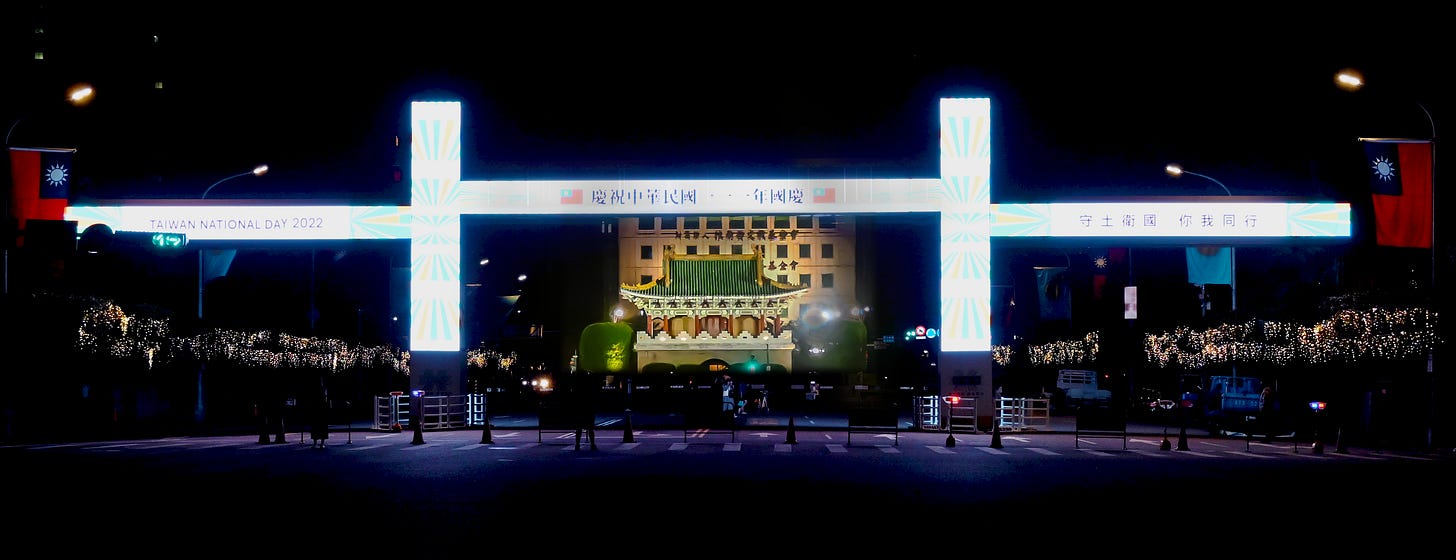
As I left the festival, a beautifully designed LED arch in the shape of the double-ten character 卄 framed Taipei’s East Gate. The East Gate is a relic of the Qing Dynasty’s brief interest in northern Taiwan. The walls that the gate once traversed were leveled by the Japanese, part of their urban modernization plan for Taipei. The gate stands across from the 228 Peace Memorial Park, dedicated to Taiwan’s decades of White Terror. The LED arch implicitly celebrates Taiwan’s silicon-based industrial prowess. It was erected to celebrate a national day under the Democratic Progressive Party 民主進步黨, Taiwan’s first major opposition party, and a major driver of the island’s path to democracy.
And as I write this post, Xi Jinping stands on a deserted stage, facing the Communist Party faithful of China. Speaking from behind the human-proof (albeit not microbe-proof) barrier of China’s COVID-zero policy, he speaks of Taiwan as the linchpin of his plans to “rejuvenate” China.
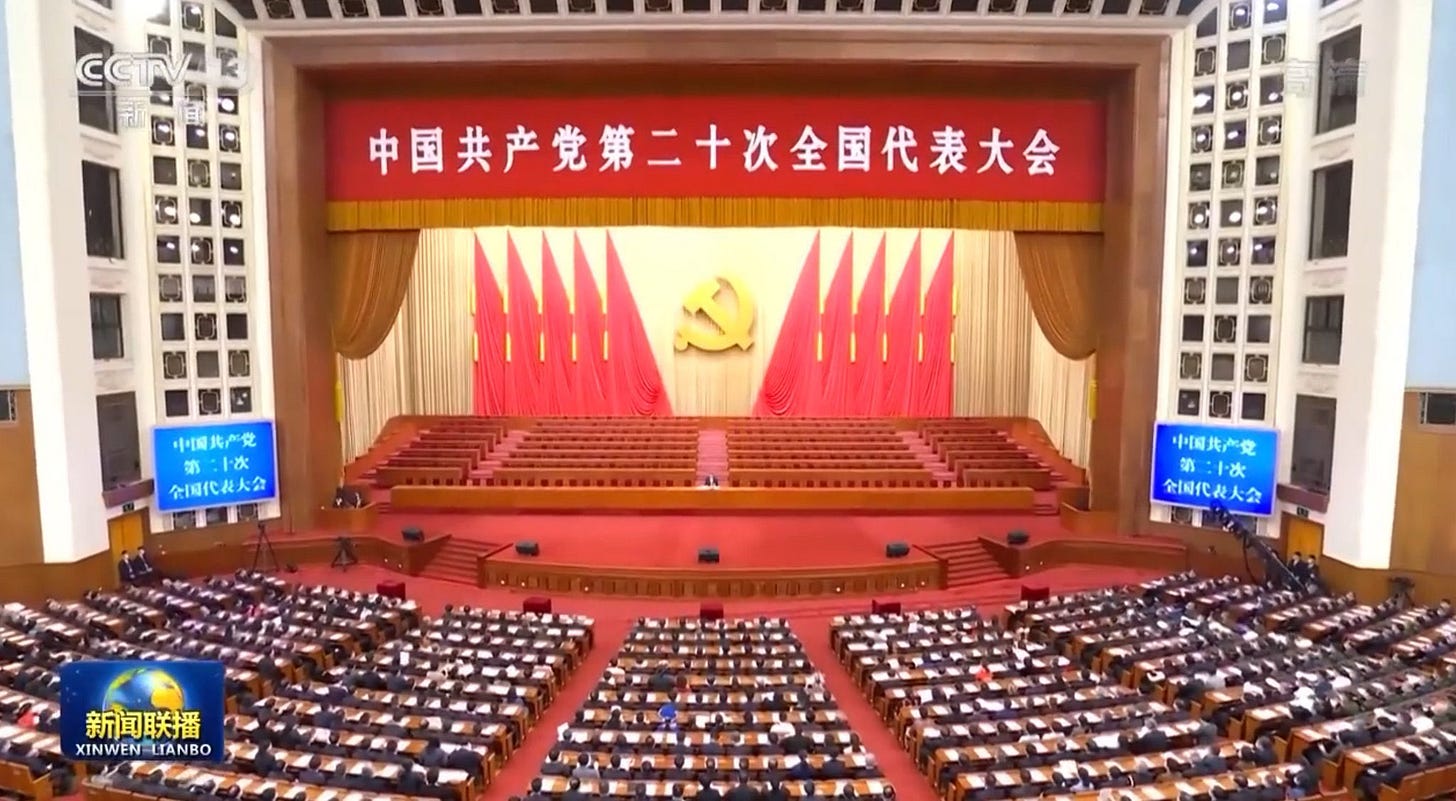
Today, I finessed a translation of guojia 國家 as “homeland.” Soon, perhaps sooner than anyone had anticipated, it will be necessary for world democracies to decide whether or not they stand with Taiwan—this bastion of human rights, democracy, gay rights, film, music, food, literature, and yes, even bureaucracy—not just as a homeland, but as a sovereign nation.
When that day comes, may it come peacefully. Until then, happy Double-Ten Festival.
Here it’s maybe worth explaining: Like many other countries, Taiwan has a big, spectacular fireworks display to celebrate national day. However, the display rotates cities every year, and this year wasn’t Taipei’s turn. Thus, the national day activities that were on offer locally were on a slightly smaller scale, and not quite as aggressively promoted.




